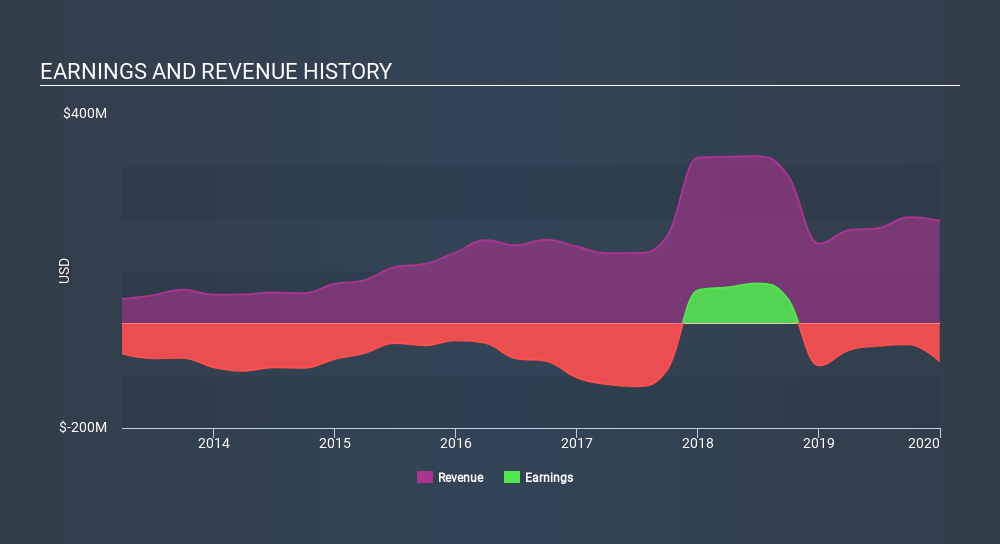Stock Analysis
- United States
- /
- Biotech
- /
- NasdaqGS:HALO
Does Halozyme Therapeutics, Inc. (NASDAQ:HALO) Have A Volatile Share Price?

If you own shares in Halozyme Therapeutics, Inc. (NASDAQ:HALO) then it's worth thinking about how it contributes to the volatility of your portfolio, overall. In finance, Beta is a measure of volatility. Volatility is considered to be a measure of risk in modern finance theory. Investors may think of volatility as falling into two main categories. First, we have company specific volatility, which is the price gyrations of an individual stock. Holding at least 8 stocks can reduce this kind of risk across a portfolio. The second sort is caused by the natural volatility of markets, overall. For example, certain macroeconomic events will impact (virtually) all stocks on the market.
Some stocks are more sensitive to general market forces than others. Beta can be a useful tool to understand how much a stock is influenced by market risk (volatility). However, Warren Buffett said 'volatility is far from synonymous with risk' in his 2014 letter to investors. So, while useful, beta is not the only metric to consider. To use beta as an investor, you must first understand that the overall market has a beta of one. A stock with a beta below one is either less volatile than the market, or more volatile but not corellated with the overall market. In comparison a stock with a beta of over one tends to be move in a similar direction to the market in the long term, but with greater changes in price.
See our latest analysis for Halozyme Therapeutics
What HALO's beta value tells investors
Given that it has a beta of 1.93, we can surmise that the Halozyme Therapeutics share price has been fairly sensitive to market volatility (over the last 5 years). Based on this history, investors should be aware that Halozyme Therapeutics are likely to rise strongly in times of greed, but sell off in times of fear. Beta is worth considering, but it's also important to consider whether Halozyme Therapeutics is growing earnings and revenue. You can take a look for yourself, below.

Could HALO's size cause it to be more volatile?
Halozyme Therapeutics is a fairly large company. It has a market capitalisation of US$2.1b, which means it is probably on the radar of most investors. It takes deep pocketed investors to influence the share price of a large company, so it's a little unusual to see companies this size with high beta values. It may be that that this company is more heavily impacted by broader economic factors than most.
What this means for you:
Since Halozyme Therapeutics tends to move up when the market is going up, and down when it's going down, potential investors may wish to reflect on the overall market, when considering the stock. In order to fully understand whether HALO is a good investment for you, we also need to consider important company-specific fundamentals such as Halozyme Therapeutics’s financial health and performance track record. I highly recommend you dive deeper by considering the following:
- Future Outlook: What are well-informed industry analysts predicting for HALO’s future growth? Take a look at our free research report of analyst consensus for HALO’s outlook.
- Past Track Record: Has HALO been consistently performing well irrespective of the ups and downs in the market? Go into more detail in the past performance analysis and take a look at the free visual representations of HALO's historicals for more clarity.
- Other Interesting Stocks: It's worth checking to see how HALO measures up against other companies on valuation. You could start with this free list of prospective options.
If you spot an error that warrants correction, please contact the editor at editorial-team@simplywallst.com. This article by Simply Wall St is general in nature. It does not constitute a recommendation to buy or sell any stock, and does not take account of your objectives, or your financial situation. Simply Wall St has no position in the stocks mentioned.
We aim to bring you long-term focused research analysis driven by fundamental data. Note that our analysis may not factor in the latest price-sensitive company announcements or qualitative material. Thank you for reading.
About NasdaqGS:HALO
Halozyme Therapeutics
A biopharma technology platform company, researches, develops, and commercializes proprietary enzymes and devices in the United States, Switzerland, Belgium, Japan, and internationally.
High growth potential with solid track record.

